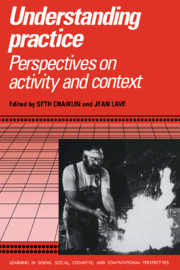Book contents
- Frontmatter
- Contents
- Series foreword
- List of contributors
- Part I Introduction
- Part II Learning craftwork
- Part III Learning as social production
- 8 Examinations reexamined: Certification of students or certification of knowledge?
- 9 Beneath the skin and between the ears: A case study in the politics of representation
- 10 The acquisition of a child by a learning disability
- 11 Context and scaffolding in developmental studies of mother–child problem-solving dyads
- 12 Solving everyday problems in the formal setting: An empirical study of the school as context for thought
- 13 Teacher's directives: The social construction of “literal meanings” and “real worlds” in classroom discourse
- Part IV Conclusion
- Author index
- Subject index
- Learning in Doing: Social, Cognitive, and Computational Perspectives
12 - Solving everyday problems in the formal setting: An empirical study of the school as context for thought
Published online by Cambridge University Press: 06 January 2010
- Frontmatter
- Contents
- Series foreword
- List of contributors
- Part I Introduction
- Part II Learning craftwork
- Part III Learning as social production
- 8 Examinations reexamined: Certification of students or certification of knowledge?
- 9 Beneath the skin and between the ears: A case study in the politics of representation
- 10 The acquisition of a child by a learning disability
- 11 Context and scaffolding in developmental studies of mother–child problem-solving dyads
- 12 Solving everyday problems in the formal setting: An empirical study of the school as context for thought
- 13 Teacher's directives: The social construction of “literal meanings” and “real worlds” in classroom discourse
- Part IV Conclusion
- Author index
- Subject index
- Learning in Doing: Social, Cognitive, and Computational Perspectives
Summary
In everyday life “thought is,” as Rogoff (1984, p. 7) puts it, “in the service of action.” Cognitive activities are thus inseparable aspects of the many concrete and abstract activities and projects that people engage in in their day-to-day affairs. The Cartesian legacy of maintaining a strict line of division between the mental and the practical in characterizing research has, however, fostered the assumption that “the only true domain of psychological study is internal mental activity” and, consequently, to regard “the problem of how social and physical context influences individuals' mental processes as unimportant or secondary” (Wertsch & Stone, 1985; cf. e.g., Kvale, 1977). In recent years, there has been a noticeable trend toward attempting to reestablish the links in research between the abstract and the concrete aspects of human activity. Carraher, Carraher, and Schliemann (1985) and Lave, Murtaugh, and de la Rocha (1984), to mention just two examples relevant to the study to be presented here, have shown how elementary arithmetic tasks are dealt with in everyday settings on the one hand and in formal contexts on the other. The results are revealing; Lave, Murtaugh, and de la Rocha (1984) observed “virtually error-free arithmetic performance” by people when acting as shoppers, but “frequent errors in parallel problems in the formal testing situation” (p. 83; cf., e.g., Marková, 1982; Rogoff, 1982).
As an epistemological project, the conscious attempt to bridge the gap between the practical and the abstract is at the heart of the Vygotskian tradition (Vygotsky, 1934/1987, 1978; cf. Wertsch, 1985).
Information
- Type
- Chapter
- Information
- Understanding PracticePerspectives on Activity and Context, pp. 327 - 342Publisher: Cambridge University PressPrint publication year: 1993
Accessibility standard: Unknown
Why this information is here
This section outlines the accessibility features of this content - including support for screen readers, full keyboard navigation and high-contrast display options. This may not be relevant for you.Accessibility Information
- 34
- Cited by
